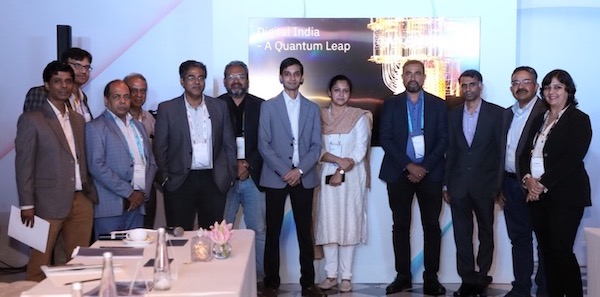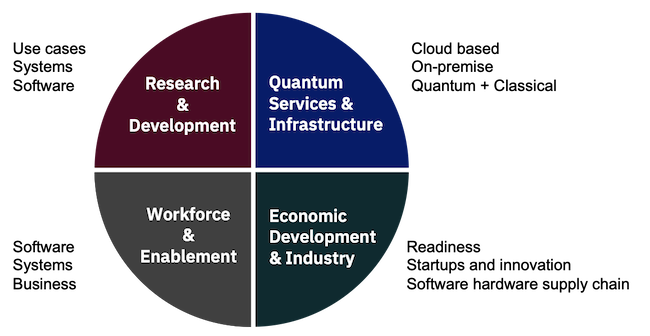IBM India/South Asia Blog
Digital India – A Quantum Leap: An India Conversation
This blog is authored by Dr. Amith Singhee, Director IBM Research India and CTO IBM India South Asia
Two weeks ago, at IBM’s flagship event THINK Mumbai, IBM released a white paper on Building a Quantum Strategy for India, unveiled by Shri Rajeev Chandrashekar, Union Minister of State for Electronics and Information Technology. The Hon'ble Minister stressed the importance of Quantum technology as part of the vision for India’s technology ambition and of taking a collaborative approach that includes industry, government, academia, and startups.
This was followed in the day by a Round table discussion on the topic “Digital India – A Quantum Leap”, with participation from esteemed leaders representing different parts of the Indian ecosystem: Dr. Shankar Venugopal, Vice President and Head of Mahindra Research Valley at Mahindra & Mahindra; Mr. Amit Saxena, Chief Technology Officer at the Reserve Bank of India Innovation Hub; Col. (Retd.) A. K. Nath, Executive Director (Corporate) at C-DAC; Dr. Sangeeta Maini, CEO of the I-HUB Quantum Technology Foundation; Prof. Anil Prabhakar, Indian Institute of Technology Madras; Prof. Bhanu Pratap Das, Director of CQuERE, TCG Crest; Mr. Nikhil Malhotra, Chief Innovation Officer at Tech Mahindra; Mr. Gireesh Neelakantaiah, Director for Quantum Go to market at Capgemini and Mr. Anil Sharma, Head of Corporate Incubation at Tata Consultancy Services.
This was a vibrant discussion on the state of Quantum computing from an India lens, the opportunities and challenges, and how the ecosystem can make Quantum real in India. Via this article, I am pleased to share the perspectives and conversations from this discussion.
We framed the discussion in continuity with the white paper and the Minister’s comments earlier in the day by highlighting the four key components that comprise a national strategy for a sustainable quantum industry in India:
Research and Development is a key catalyst for bringing the ecosystem together around concrete use cases that create value for the economy and society, with an understanding of how quantum-centric computing systems and software can address some of the hard challenges and unlock this value. This goes hand in hand with the availability of Quantum services and Infrastructure that allow the experimentation and scaling of technology needed, via multiple modalities – cloud-based, on-premise, and leveraging the best capabilities of both quantum and classical computing. Along with this, the scale of impact will be enabled by the other two components: workforce and enablement across different domains of software, computing systems, and business around quantum; and Economic Development and industry where industry readies itself for leveraging quantum and develops innovations, startups and a software-hardware supply chain for quantum.
The Quantum computing development roadmap published by IBM was discussed as an illustration of where we stand in terms of the hardware technology progression and future milestones. The participants were then posed with questions on realizing the quantum strategy for India and each of them presented an insightful perspective. Here are some of my takeaways from the discussion:
Transformative impact across industries: Looking across industries, participants observed that Quantum computing could have a broad transformative impact across industries, around use cases of optimization, simulation, and machine learning. Early movers include Financial Services, Life Sciences, Aerospace, Automotive, and to some extent Energy and Chemicals. While India is yet to see meaningful participation from the industry, some leaders globally, especially in automotive, aerospace, and finance, are exploring specific use cases as part of their roadmap through multiple approaches –setting up internal teams, an ecosystem of partners, consortiums, and the like. For instance, in chemistry, where discovering new molecules for various applications takes significant time today, businesses are exploring the application of Quantum Computing to accelerate this discovery process. The Telecom sector is seeing interest in use cases such as network bandwidth optimization
Automotive and Financial sectors could be the front runners: The round table discussed specific use cases in automotive and financial sectors. We identified three areas where the automotive and mobility industry can see significant benefits, given Quantum computing’s promise of addressing large computational problems that could not be addressed by classical computing. First, with the growing usage of electric vehicles, energy storage and discovering better battery materials become important for a sustainable future. Second, managing traffic flow and intelligent transport systems with optimal routing and logistics where quantum computing can allow for the solution of large optimization problems in full detail. Third, Decision making with large amounts of sensor data leveraging machine learning at scale.
In the banking, financial services, and insurance (BFSI) sector, two critical and growing challenges - financial fraud and cyber-security threads, were identified of paramount importance. Here, a combination of big data analysis and artificial intelligence with quantum-centric computing could help address these challenges and ensure secure and trustable financial systems in the future. There is an opportunity for academia to come together with industry to develop quantum computing approaches for such challenges so that we are ready as the technology matures.
Skilling and enabling a national workforce in Quantum: This topic was discussed at length as it was felt that it is important to have the right building blocks – a forward-thinking government with a consistent agenda coupled with requisite course programs that are curated and targetted towards different skill types. This should include industry-ready courses tied to use cases, operations, and maintenance across L1, L2, and L3 support, and across software, solutions, and manufacturing. There is a need to have standards that can enable the adoption and scaling of technology, methods, and skills, and for the involvement of industry and startups to match with job opportunities. Given that the market for quantum jobs is evolving, we discussed the need to train for quantum skills in a way that also empowers the students to branch-out into adjacent areas of technology. This gives students the flexibility to advance their careers while still being quantum ready. Hubs and academia-industry partnerships can play a role to shape the skilling programs but also in proactively identifying viable opportunities for the emerging workforce. It was stressed that the ecosystem needs to work together collaboratively and openly.
The corporate world, especially service companies, is using creative approaches to developing skills and teams, that can help customers cut through the confusion around the technology and identify immediate steps. Apart from hiring quantum computing talent, there is also significant reskilling and upskilling being done with optimization and machine learning researchers also skilling in quantum computing. There is a need to build a talent pipeline and have visibility within the ecosystem, and the importance of building a multi-disciplinary team that includes people with a background in science and technology, such as physics, chemistry, and computing.
Focus on Research and Development: Participants stressed that investment in research is an investment in society, and to do it right government, academia, and industry organizations should collaborate while accommodating their own goals and priorities. All organizations must have short-, medium- and long-term goals. Some will be early adopters, and some may engage with the technology down the road. Hubs can play the role of a convener across these different organizations to enable engagement and continuity, around research that addresses some of the difficult and critical challenges that are faced by industry and society. We discussed how the superposition and entanglement properties of qubits, make quantum computers uniquely suited to simulating atoms, molecules, and similar many body systems with quantum mechanical behavior. As an illustration, the Variational Quantum Eigensolver (VQE) algorithm used to model such systems, could potentially be augmented to address additional applied problems such as drug design, modeling batteries, and discovering new materials. What also came to the fore is that there is substantial interest and awareness amongst graduate students looking to research such topics.
The round table ended with an extended discussion and much excitement among the group to carry forward the discussions in the broader Indian ecosystem, and a determination to bring a collaborative ethic to developing the quantum approach in India.

